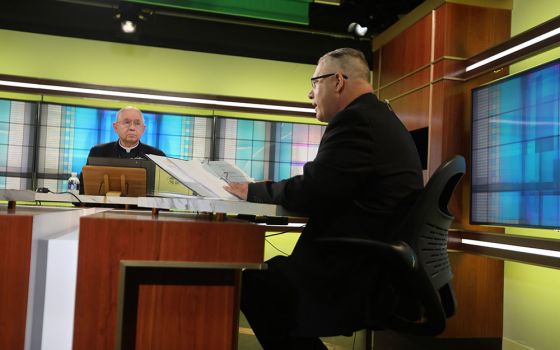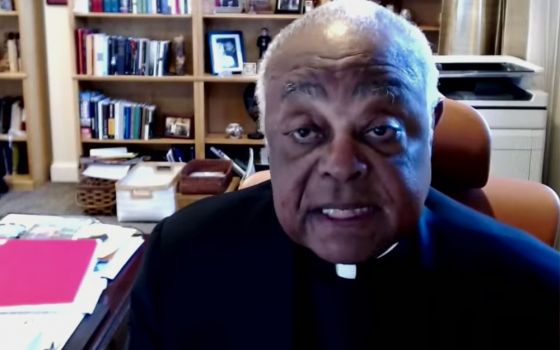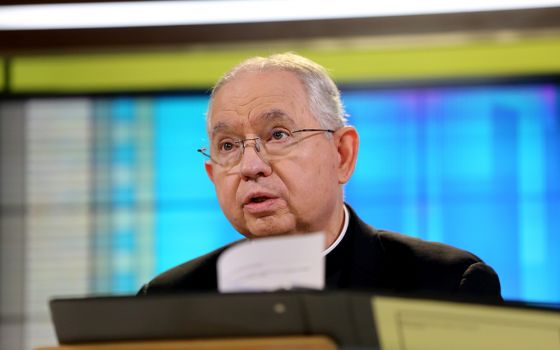Bishop Shawn McKnight of Jefferson City, Missouri, speaks from the floor on the first day of the spring general assembly of the U.S. Conference of Catholic Bishops in Baltimore June 11, 2019. (CNS/Bob Roller)
Although the upcoming meeting of the U.S. bishops conference is already attracting controversy over a plan to draft a document about whether pro-choice Catholic politicians like President Joe Biden can take Communion, at least one bishop is hoping to discuss something a bit less contentious.
Jefferson City, Missouri, Bishop Shawn McKnight told NCR recently he hopes he and his confreres might discuss Pope Francis' creation in May of a new official ministry in the church for lay men and women who teach the fundamentals of the faith.
Bishop Shawn McKnight of Jefferson City, Missouri, speaks from the floor on the first day of the spring general assembly of the U.S. Conference of Catholic Bishops in Baltimore June 11, 2019. (CNS/Bob Roller)
The pope opened the new ministry of catechist on May 11 to laypeople worldwide "of deep faith and human maturity," but asked that each national bishops' conference determine "the necessary process of formation and the normative criteria for admission" to the role.
McKnight said on May 26 that he had yet to hear from the U.S. conference about whether they will discuss creating norms for the catechist role at their gathering, being held virtually from June 16-18.
"I'm hopeful that … there will be some at least initial report, or laying out the idea of how they're going to go about establishing those norms," he said. "Until now, I haven't heard anything."
An outline of the gathering's agenda released to the press on June 8 appeared to signal that the bishops would not be discussing norms for the catechist role. The matter was not listed among nine other action items for the meeting, which included the document about pro-choice politicians.
McKnight, who has led the church in Missouri's state capital since 2018, suggested that any new norms could take a similar form to the National Directory for the Formation, Ministry and Life of Permanent Deacons in the United States, which the conference first approved in 2003 and then modified in 2019.
The document about permanent deacons, McKnight said, "outlines the theology and the understanding of the ministry, and then qualifications for candidates."
A similar document about the new role of catechist, he suggested, "would be established by the conference, and then each individual diocese and bishop would be able to implement it — adapt it — according to local circumstances."
In the Catholic Church, a catechist is someone who teaches the core principles of the faith. In earlier centuries, catechists were often priests or members of religious orders, but they are now frequently lay persons who volunteer or are sometimes employed at Catholic schools or parishes.
According to Francis' apostolic letter creating the new ministry of catechist, Antiquum Ministerium, laypersons who serve in the role can now be officially instituted as ministers for their local dioceses and receive recognition for what the pope termed a "stable form of service rendered to the local Church."
Advertisement
The pope's opening of the new ministry to both men and women came shortly after he made explicit in January that Catholic laywomen can also be formally installed in the church as lectors and acolytes (often known as altar servers).
McKnight said the pope's moves on the three roles are part of a wider reevaluation since the 1962-65 Second Vatican Council about ways to have "a substantial and stable form of ministry, recognized in the church, that is proper to the laity."
The bishop suggested that the U.S. conference might propose opening the new catechist ministry, and lector and acolyte opportunities, to those already serving in such roles across the country.
"I think we have to recognize, too, that we already have laypeople who are fulfilling those ministries," said McKnight. "Those who are already doing it should be the first ones who are instituted in those various ministries."
"We have to be aware, too, that this is new," he said. "And we're going to be going through several decades of experimentation and trying things out, and learning as we go along."






